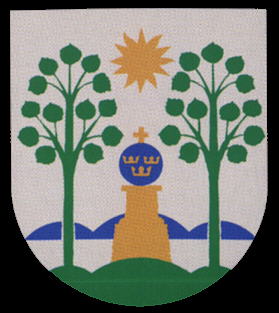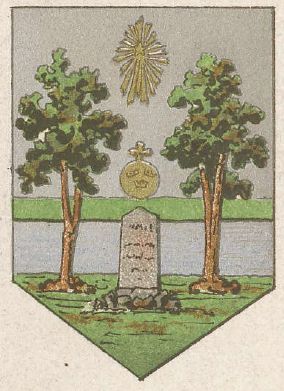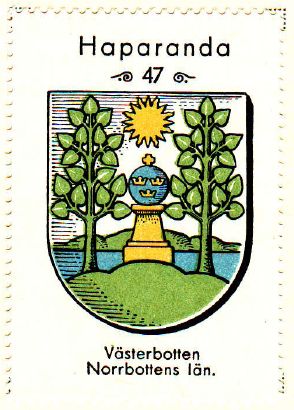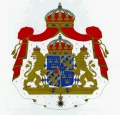Haparanda: Difference between revisions
Knorrepoes (talk | contribs) m (Text replacement - "====Official blazon====" to "===Official blazon===") |
Knorrepoes (talk | contribs) m (Text replacement - "|-↵|'''English''' " to ". |- |'''English''' ") Tags: Mobile edit Mobile web edit |
||
| (11 intermediate revisions by the same user not shown) | |||
| Line 1: | Line 1: | ||
'''HAPARANDA''' | '''HAPARANDA''' | ||
Province (Landskap): [[Norrbotten]] <br> | Province (Landskap): [[Norrbotten]] <br> | ||
County (Län): [[Norrbottens län]] <br> | County (Län): [[Norrbottens län]] <br> | ||
Additions : 1969 [[Karl Gustav]], Nedertorneå | Additions: 1969 [[Karl Gustav]], Nedertorneå | ||
[[File:haparand.jpg|center|Arms (crest) of {{PAGENAME}}]] | [[File:haparand.jpg|center|Arms (crest) of {{PAGENAME}}]] | ||
= | {| class="wikitable" | ||
|+Official blazon | |||
|- | |||
|'''Swedish''' | |||
| | |||
I fält av silver en från ett grönt treberg mellan två uppväxande gröna aspar under en sol av guld uppskjutande riksgränsstolpe av guld med ett blått klot, belagt med tre kronor av guld och krönt med ett kors av guld, lagd över ett svävande, genomgående, nedtill rakt avskuret blått treberg. | I fält av silver en från ett grönt treberg mellan två uppväxande gröna aspar under en sol av guld uppskjutande riksgränsstolpe av guld med ett blått klot, belagt med tre kronor av guld och krönt med ett kors av guld, lagd över ett svävande, genomgående, nedtill rakt avskuret blått treberg. | ||
|- | |||
|'''English''' | |||
| blazon wanted | |||
|} | |||
===Origin/meaning=== | |||
Haparanda, which is situated on the Westside of the Torne river, became a town in 1842, when Finland and those parts of West Bothnia and Lapponia which lies east of the river had become Russian in 1809. The then borough (köping) got its arms in a royal letter in 1828, and the from a heraldic point of view not entirely good composition bears a clear impression of the 19th Century, though a slight adjustment was made in the beginning of the 1970's. The arms were registered in 1977. | Haparanda, which is situated on the Westside of the Torne river, became a town in 1842, when Finland and those parts of West Bothnia and Lapponia which lies east of the river had become Russian in 1809. The then borough (köping) got its arms in a royal letter in 1828, and the from a heraldic point of view not entirely good composition bears a clear impression of the 19th Century, though a slight adjustment was made in the beginning of the 1970's. The arms were registered in 1977. | ||
| Line 23: | Line 31: | ||
|} | |} | ||
'''[[Civic Heraldry Literature - Sweden|Literature]]''': Nevéus and de Waern, 1992 | |||
{{se}} | |||
{{media}} | {{media}} | ||
[[Category:Swedish Municipalities H]] | [[Category:Swedish Municipalities H]] | ||
Latest revision as of 12:29, 11 February 2024
HAPARANDA
Province (Landskap): Norrbotten
County (Län): Norrbottens län
Additions: 1969 Karl Gustav, Nedertorneå
| Swedish |
I fält av silver en från ett grönt treberg mellan två uppväxande gröna aspar under en sol av guld uppskjutande riksgränsstolpe av guld med ett blått klot, belagt med tre kronor av guld och krönt med ett kors av guld, lagd över ett svävande, genomgående, nedtill rakt avskuret blått treberg. |
| English | blazon wanted |
Origin/meaning
Haparanda, which is situated on the Westside of the Torne river, became a town in 1842, when Finland and those parts of West Bothnia and Lapponia which lies east of the river had become Russian in 1809. The then borough (köping) got its arms in a royal letter in 1828, and the from a heraldic point of view not entirely good composition bears a clear impression of the 19th Century, though a slight adjustment was made in the beginning of the 1970's. The arms were registered in 1977.
The asps and the two mountains which shall give an impression of the Torne river between them, together make the arms canting, as the name is Finnish for "asp beach". The golden sun, which because of its position on the silver field is breaking the tincture rule, is to symbolize the midnight sun. The border mark is of course a sign for the town's situation at the border to Finland.
By the arms adjustment in the 1970's, it was suggested that this mark would be removed from the arms, as it could hurt the feelings of the brother nation on the other side of the border - a removal could on the other hand just as well be interpreted as if Sweden wanted to regain its claim of wanting to reconquer Finland.
| The arms as shown by Liljeblad, 1878 |
The arms in the Kaffe Hag album +/- 1935 |
Literature: Nevéus and de Waern, 1992
Sweden heraldry portal
This page is part of the Sweden heraldry portal |
Heraldry of the World |
|
Civic heraldry:
|
Other heraldry: |
Contact and Support
Partners:
Your logo here ?
Contact us
© since 1995, Heraldry of the World, Ralf Hartemink 
Index of the site














